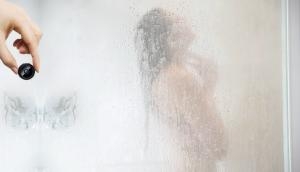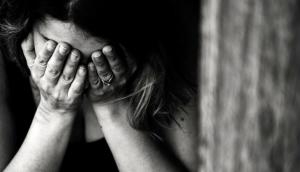
Women aren't funny, or so many believe. Witty women, thanks to patriarchy, are often considered too smart, unattractive, too fat, ugly, or all of the above.
Not that any of these things are as offensive as the assumption that women can't joke, or worse, can't take a joke.
While these dynamics between women and wit are fairly global, things get a lot more tricky in the Indian subcontinent. Sexist humour keeps our WhatsApp group chats alive, despite most of these jokes being abysmally unfunny.
That unfunny men get to dictate what a good joke is, is a problem. And that our female comics must convince these men otherwise, is frankly, a pain.
Also read - I cannot escape the jungle of patriarchy, confesses Dibakar Banerjee
Famous Indian stand-up comic, Aditi Mittal, lamented this phenomenon on The Bridge Talks stage in Delhi recently. Always introduced as a 'female comedian', Mittal claimed that the girls in the audience swoon all over male comics, but she doesn't get such attentionBecause, you see, to top everything, a funny woman is also unsexy.
"GET OFF YOUR HIGH HORSE," he screamed from his ivory tower.
— Aditi Mittal (@awryaditi) October 13, 2016
Catch interviewed Aditi Mittal and she talked about being an 'added expenditure', how she asserts her identity as an Indian woman on international shows, and more.
DS: Is there a wage gap in the comedy industry that you've encountered?
AM: Is there? Is society patriarchal? Of course it is. Yes, there's a wage gap. In fact, it's not even a wage gap, it's a hiring gap. In fact we don't have access to half the spaces guys would get hired into.
I've been called for gigs and then told, 'Engineering college hai, Aditi. All boys. Tereko khajayenge.' I've had to let go of gigs because [I've been told], 'Listen, there's you and seven men travelling. And on any given occasion, we'd have men partner up for rooms [at the venue], but since it's just you travelling alone, it's an added expenditure.'
DS: Wait, you're an 'added expenditure?'
AM: Yep, I'm an added expenditure. Because, you see, my room will be single and therefore an added expenditure. This is more expensive for producers to take on.
And so, in terms of just the spaces you can go perform, [women] are severely limited.
DS: So is there also a difference in how you're treated, what you're provided?
AM: Yeah, there's a difference. I mean it's not something I'd write home about. It's not a question of discrimination, but it's just not financially feasible for a producer to take me along because of my gender.
I don't work with guys as much anymore so I'm not travelling solo and it's working out pretty well. I'm having a good time.
DS: Do you feel the need to incorporate gender in your comic acts?
AM: What the f*ck else am I gonna do? Like one of the greatest things about comedy is that it's personal, that it's about you. And so, I cannot give you comedy from the perspective of a Russian hamster who has a lump in his throat because he just saw an emotional movie. I can give it to you from the perspective of a 29-30-year-old woman from India who is single.
DS: What are the pressures of stand-up? Do they come in the way of your voice being taken seriously?
AM: Eh, I'll be honest with you. I don't really give a f*ck about being taken seriously. I think it's one of those things where, if you're serious, people would be like, "Ey, joke bol na" and if tell them a joke, they go, "Whaya jokin' all the time, man? Say something serious no."
DS: Sure, but important things are often said in a comedic manner, right? Does your audience understand you?
AM: Honestly, it's not my job to see if they get it or not. My job is to make them laugh. If it makes them think, that's an added bonus.
But really, if they laugh I'm like (pretends to gallop away), "Thank you, bye!" That's my objective.
Also read - Mona Eltahawy on Trump, Twitter trolls and the threat of modesty culture
DS: You mentioned that women aren't associated with humour enough. But when they are, why do you think there's such a white female hegemony? When it comes to comedy and women, one thinks of Tina Fey, Amy Schumer, Ellen. How do you assert yourself as an Indian female voice?
AM: Yeah, I feel like it's also a question of the networks we're placed in front of. For example, it's just white females who have [access to] the Comedy Central specials and have shows on NBC. Also, their stories inculcate more mainstream white men that would be weird to script and put into a narrative [for their consumption].
[This would] be more palatable to [such a white male] audience, instead of a show with some random brown, magenta, maroon person.
I just finished travelling abroad. I was in London, then US, doing shows. I was kind of hell bent on maintaining my authenticity, maintaining my Indianness. I decided 'I'm not gonna Russell Peters it, not go: Hulloo my frands, my parents beat me/Somebady gonna geta hurt real bad.'
I wasn't going to do that. But I was keen on maintaining my identity as an Indian woman and luckily, I had the time to navigate that space.
That's the objective. To be able to tell your story, your version, without being like, 'Hullooo. Bindi.' etc. Yeah, it's that.
First published: 15 October 2016, 7:13 IST







![BJP's Kapil Mishra recreates Shankar Mahadevan’s ‘Breathless’ song to highlight Delhi pollution [WATCH] BJP's Kapil Mishra recreates Shankar Mahadevan’s ‘Breathless’ song to highlight Delhi pollution [WATCH]](https://images.catchnews.com/upload/2022/11/03/kapil-mishra_240884_300x172.png)

![Anupam Kher shares pictures of his toned body on 67th birthday [MUST SEE] Anupam Kher shares pictures of his toned body on 67th birthday [MUST SEE]](https://images.catchnews.com/upload/2022/03/07/Anupam_kher_231145_300x172.jpg)






